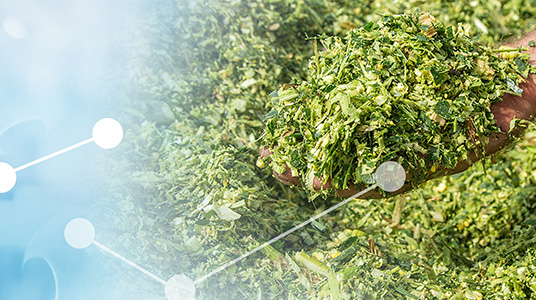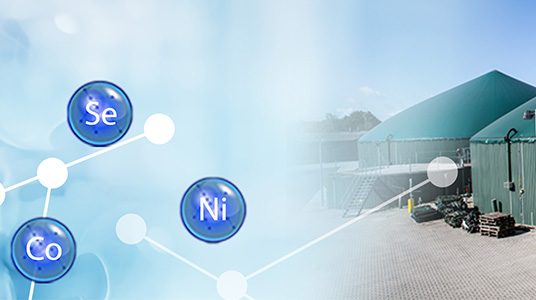Optimum biology
Innovative all-in-one solutions and powerful individual products for your agribusiness
No matter what your biogas plant comes up against, we help you analyse the problem, and can offer both immediate remedies and permanent solutions. With our effective trace elements, enzyme products, macro elements or silage additives, you can optimise your operational workflow and increase your biogas yield in the long term.
Trace elements
Trace elements in solid or liquid form help to optimise the performance of your biogas plant — including as an emergency response to urgent biological problems. Complex trace element mixtures as bagged goods (P) or liquid product (L), complies with TRGS 529.
MiaMethan Complex L
Liquid trace element mixtures for immediate or automated dosing. The right mixture for each fermenter in 25 litre canisters, 220 litre barrels or in 1000 litre IBC.
- MiaMethan Complex Cobalt L
- MiaMethan Complex L2
- MiaMethan Complex L3
- MiaMethan Complex L4
MiaMethan Complex P
Emergency mixtures with quick delivery or analytically customised mixtures specifically for your biogas plant in a fermentable bag. Especially sustainable due to complete utilisation with “lost packaging”.
- MiaMethan Complex P1
- MiaMethan Complex P2
- MiaMethan Complex P3
Biomin GoldFerm S
The former Biomin product for highly effective trace and micronutrients for biogas plants.
Biomin GoldFerm S liquid
The former Biomin product for highly effective trace and micronutrients for biogas plants in liquid form.
Enzyme products
Enzymes support efficient fermentation in the biogas plant. Shortened fibres make the fermentation substrate more liquid, saving you mixing and pumping costs.
MiaMethan ProCut L
Highly active liquid enzymes with a high xylanase content for stubborn fibres. Optimum mixing and easy to add in compliance with TRGS through automated dosing stations.
MiaMethan ProCut P
Specially designed enzyme mixture in biodegradable tubular film bags that can be added each day through the solids dispenser. Small packaging, easy handling and low transport costs.
MethaPlus
The former DSM product for high-fiber substrates such as corn, grass and slurry. Increase substrate turnover, reduce viscosity, dissolve floating layers.
Axiase™
The former DSM product for grain-based substrates such as roe. Triticale, wheat, barley. Substrates on cereal base (GPS), avoids and dissolves floating layers, improves flowability, reduces energy consumption and wear.
Biomin GoldFerm E3
The former Biomin product for multi – enzyme mixture for biogas plants.
Biomin GoldFerm E3 liquid
The former Biomin product for multi – enzyme mixture for biogas plants in liquid form.

Iron products
Iron hydroxide is a powdered reagent used to bind hydrogen sulphide in fermenters. This prevents plant equipment and engines from corroding or engine oil from becoming acidic.
MiaMethan Fe 43
Reagent in granular form used for desulphurisation in plants with average retention times.
MiaMethan Fe S
Reagent in granular form used for rapid desulphurisation in plants with short retention times.
Biomin GoldFerm FE
The former Biomin product (min. 97% iron II oxide) for desulfurization and iron deficiency in biogas plants.
Biomin GoldFerm FE liquid Spezial
The former Biomin product for liquid combination preparation for desulfurization, iron deficiency and ammonia reduction in biogas plants.

Silage additive
Biological silage additives are required to optimally conserve the substrates of many renewable raw materials. They can be used in the biogas and livestock farming sector to maximise the silage quality.
MiaSilage Duo
Homo- and heterofermentative silage additive for lowering pH and reducing reheating.
MiaSilage LG
Homofermentative silage additive for rapidly lowering pH.
MiaSilage M
Heterofermentative silage additive for improved maize silaging.
MiaSilage TS
Heterofermentative silage additive for reducing feed spoilage with dry silage.


